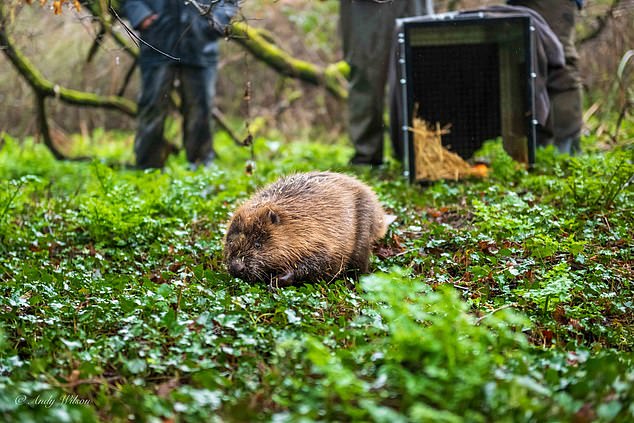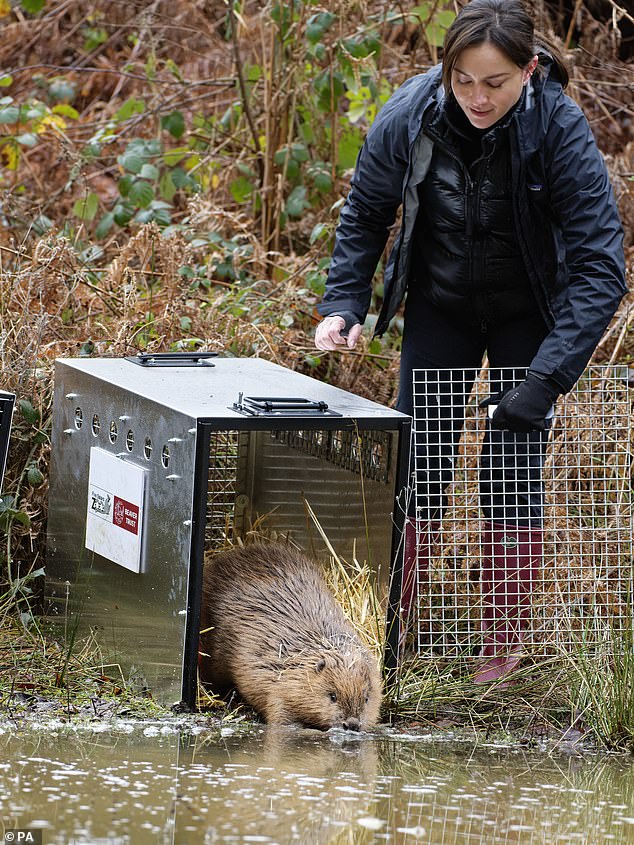
The Conservative Environmental Network chair, Ben Goldsmith, says Britain’s arrogance about rewilding is preventing it from reintroducing lost predators.
Financier and green campaigner, Goldsmith, 42, claims that Britons once had a moral duty to live alongside once-native animals, including wolves and lynxes, before they were forced into extinction by out ancestors.
Goldsmith asked: ‘What’s with this British exceptionalism that we are somehow too grand and too civislised to rewild?’ during a talk at the Hay Festival, with environmentalist Isabella Tree.
‘Countries which are significantly poorer and more food-insecure than we are, we expect them to look after their wolves and their lions and their jaguars and all these other charismatic species, but when it comes to Britain, no, no,no’, he said.
The debate over whether to reintroduce species in Britain has started to gather pace in recent years.

Beavers are returning to the UK as part of a rewilding project
For the first time in thousands of years, bison are roaming the fields of Kent, while beavers have also been seen making a resurgence in Britain’s waters.
Currently assessments are being made over the feasibility of reintroducing lynx to the wilds.
Wolves on the other hand, a different story, after being eradicated in Britain during the 18th century due to concerns over sheep farming, there are no plans bring them back into the fold.
Goldsmith suggested that successful rewilding projects across Europe has shown that both predators and farmers could coexist and that it was simply ‘inevitable that we’ll get back Lynx and eventually wolves’.
He branded the notion that wolves can be ‘trotting around the outskirts of Amsterdam or Brussels‘ but not in the UK, ‘absurd’.
He argued: ‘People say ‘well farmers hate them,’ it’s simply not true.
‘In France if you’re growing crops, if you’re growing vines, if you’re growing vegetables and fruit, if you’ve got pigs which are susceptible to African swine fever, then the real problem for you is exploding numbers of deer and wild boar.’
‘The only places in Europe where those animals under control is where wolves have a recovery.
‘One pack of wolves in Spain was observed to kill 50 deer and 50 wild boar in a single year. So those farmers are delighted with the return of wolves.’
While a strong advocate for reintroducing wild animals to British countryside once again, Goldsmith did admit that there was a risk to livestock, however he said it was a price worth paying.




A Eurasian beaver emerging from a travel cage to swim off into a pond in a large woodland enclosure soon after release, at Ewhurst Park, Hampshire, four hundred years after they went extinct in Hampshire, as part of a large biodiversity project to regenerate the landscape
‘All wildlife is difficult,’ he said.
‘All my chicken got killed last year by a fox. Do I want foxes eradicated? Would we get permission to reintroduce foxes if they were extinct in Britain? I doubt it.’
He added: ‘Otters will eat your decorative fish, pine martens will make a hole in your roof and move into the space up there and keep you awake all night. Everything’s a nuisance.’
Goldsmith said that Britain should ‘find a way to coexist and find harmony’ with wild animals, calling it a ‘moral duty’.
According to Goldsmith, whose brother is a Conservative life peer, farming representatives had undue influence over the decision-makers at Defra (Department for Environment Food and Rural Affairs).
This, he said, had prevented progress being made on rewilding.
Source: | This article originally belongs to Dailymail.co.uk